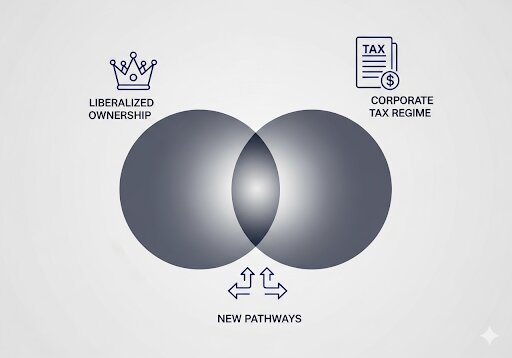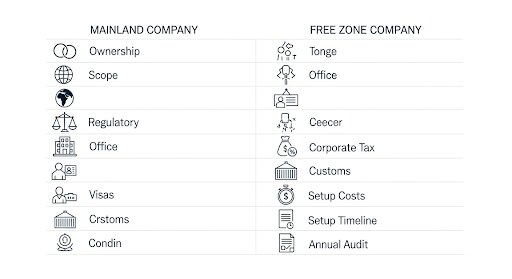Table of Contents
Introduction: The New Strategic Landscape
- The Evolving Choice for Investors
- Key Developments Shaping the Decision
Defining the Jurisdictions: Mainland vs. Free Zone
- Mainland (Onshore) Company
- Free Zone Company
Comparative Analysis of Mainland vs. Free Zone
Strategic Considerations for 2025 and Beyond
- Target Market and Business Activities
- Corporate Tax Implications
- Scalability, Costs, and Visas
Alternative Structures
- The Hybrid Model
- Offshore Companies
Conclusion and Recommendations
- When to Choose a Mainland Company
- When to Choose a Free Zone Company
- The Importance of Expert Counsel
For any foreign investor entering the United Arab Emirates (UAE), the foundational strategic decision is the choice of jurisdiction: establishing a company on the "mainland" (onshore) or within one of the nation's more than 40 specialized free zones. This decision has profound and lasting implications for a company's ownership structure, market access, regulatory obligations, and tax liability.

Historically, the choice presented a clear trade-off: free zones offered 100% foreign ownership but restricted access to the domestic UAE market, while the mainland provided full market access but typically required a local Emirati partner. However, as of September 2025, this landscape has been fundamentally reshaped by significant legal and economic reforms.
Key developments that now govern this strategic choice include:
- Liberalized Mainland Ownership: Amendments to the UAE Commercial Companies Law have abolished the need for a local sponsor for most business activities, permitting 100% foreign ownership for mainland companies in a wide array of sectors. This has largely neutralized one of the free zones' primary historical advantages.
- The UAE Corporate Tax Regime: The introduction of a federal corporate tax subjects mainland companies to a 9% tax on profits exceeding AED 375,000. Free zone companies can potentially benefit from a 0% tax rate, but only on "Qualifying Income" and only if they meet the strict criteria to be considered a "Qualifying Free Zone Person". This has made tax implications a central pillar of the jurisdictional decision.
- New Pathways for Market Access: Landmark legislation, such as Dubai's Executive Council Resolution No. (11) of 2025, has created regulated pathways for free zone companies to obtain licenses and operate directly on the mainland, blurring the traditional operational boundaries.

Consequently, the decision is no longer a simple binary choice between ownership and market access. It has evolved into a sophisticated calculation involving the specific business model, target market, operational costs, visa requirements, and, most critically, the nuanced tax implications under the new corporate tax law. This guide provides a comprehensive comparison to help investors navigate this new landscape and make the optimal strategic choice for their business objectives.
Defining the Jurisdictions: Mainland vs. Free Zone
Understanding the fundamental nature of each jurisdiction is the first step in the decision-making process.
Mainland (Onshore) Company
A mainland company is an onshore entity licensed by the Department of Economy and Tourism (DET) or an equivalent authority in the respective emirate. The defining characteristic of a mainland company is its freedom to conduct business without geographical restriction across the entire UAE market, including within free zones. Mainland companies are also eligible to bid for and work on lucrative UAE government contracts, a market inaccessible to free zone entities. They are governed directly by federal and local UAE laws.
Free Zone Company
A free zone company is an entity established within a designated economic zone. Each of the UAE's 50+ free zones is governed by its own independent Free Zone Authority (FZA), which issues licenses and enforces its own set of rules and regulations. The core proposition of a free zone has always been to attract foreign direct investment by offering benefits such as 100% foreign ownership, 100% repatriation of capital and profits, and exemptions from customs duties. Operationally, a free zone company's activities are traditionally restricted to within its geographical boundaries or international markets. Direct trade with the UAE mainland typically requires appointing a local distributor or agent.
Comparative Analysis of Mainland vs. Free Zone
The following table provides a detailed comparison of the key features differentiating mainland and free zone company structures as of Q3 2025.
Feature Mainland Company Free Zone Company Ownership Structure 100% foreign ownership is now permitted for most commercial and industrial activities. Certain strategic sectors may still require a UAE national partner. 100% foreign ownership is the standard model and a core benefit across all free zones. Scope of Business Unrestricted ability to trade and operate anywhere in the UAE and internationally. Eligible to bid for government contracts. Operations are generally restricted to within the free zone or internationally. Direct trade with the mainland requires a local agent or a specific mainland license/permit. Regulatory Authority Licensed and regulated by the Department of Economy and Tourism (DET) and other relevant government bodies (e.g., Ministry of Labour, Municipality). Licensed and regulated by the specific Free Zone Authority (FZA) of the chosen zone (e.g., JAFZA, DMCC Authority). Office Requirements A physical office space is mandatory. A minimum area (e.g., 200 sq ft) is typically required. Virtual offices are not permitted. Highly flexible. Many zones permit licensing with flexi-desks, co-working spaces, or virtual office arrangements, reducing initial costs. Visa Quotas No fixed limit on the number of visas. The quota is directly linked to the size of the physical office space leased (typically one visa per 80-100 sq ft). Visa quotas are generally limited and linked to the type of facility leased. A flexi-desk package may only allow for 1 to 6 visas. Corporate Tax Subject to the standard 9% federal corporate tax on annual taxable profits exceeding AED 375,000. Can be eligible for a 0% corporate tax rate on "Qualifying Income" if the company achieves "Qualifying Free Zone Person" status. Customs Duties The standard 5% customs duty applies to most imported goods. 100% exemption from customs duties on goods imported into and re-exported from the free zone. Setup Costs Generally higher, with typical costs ranging from AED 20,000 to AED 50,000+ due to mandatory office space and multiple approvals. Generally lower and more budget-friendly for startups, with packages ranging from AED 10,000 to AED 50,000+. Setup Timeline Typically longer, taking 2–4 weeks due to the need for approvals from multiple government agencies]. Generally faster and more streamlined, often taking 1–3 weeks, as all approvals are handled by the single Free Zone Authority. Annual Audit Mandatory for all mainland companies to prepare and maintain an audited financial statement at the end of each fiscal year. Varies by free zone. However, an audit is mandatory for any free zone company wishing to benefit from the 0% corporate tax regime.

Strategic Considerations for 2025 and Beyond
The choice of jurisdiction is no longer based on a single factor but on a holistic assessment of a company's business model and long-term goals.
Target Market and Business Activities
The primary consideration remains the target market.
Local Market Focus: If the business model involves direct sales of goods or services to consumers and businesses within the UAE (e.g., retail outlets, restaurants, local consulting services), a mainland company is the most direct and effective structure. It provides unrestricted access to the entire domestic economy and is the only structure eligible to bid for government contracts.
International Focus: If the business is primarily focused on international trade, export/re-export, or providing services to clients outside the UAE, a free zone company is often the more practical and cost-effective choice.
However, the introduction of new regulations like Dubai's Executive Council Resolution No. (11) of 2025 is blurring these lines. This resolution allows Dubai-based free zone entities to obtain a license or temporary permit from the DET to conduct specific activities on the mainland. While this offers unprecedented flexibility, it comes with the compliance requirement of maintaining separate financial records for onshore operations, which will be subject to the standard 9% corporate tax.
Corporate Tax Implications
The new corporate tax regime is arguably the most critical factor in the modern decision-making process.
- Mainland: The tax implications are straightforward. A 9% corporate tax is levied on taxable income exceeding AED 375,000 annually.
- Free Zone: The potential to achieve a 0% corporate tax rate is a powerful incentive, but it is not automatic. To qualify, a company must:
- Achieve "Qualifying Free Zone Person" (QFZP) status.
- Generate "Qualifying Income" from approved activities, which primarily involves transactions with other free zone entities or international clients.
- Maintain adequate physical substance (offices, employees, expenditure) within the free zone.
- Not exceed the threshold for non-qualifying income (e.g., from mainland sources).
- Prepare and submit audited financial statements.
Failure to meet any of these conditions could result in the company losing its QFZP status and becoming subject to the standard 9% corporate tax on all its income. This makes the free zone option ideal for businesses with minimal mainland interaction but introduces a significant compliance burden.
Scalability, Costs, and Visas
Practical operational needs also play a crucial role.
Startups and SMEs: Free zones are often more attractive for startups and small businesses due to lower initial setup costs, faster incorporation times, and the availability of flexible, low-cost office solutions like flexi-desks.
Labor-Intensive Businesses: A mainland company is often the better choice for businesses that require a large workforce. While there is a mandatory physical office requirement, there is no upper limit on the number of employee visas, which scales directly with the size of the office space leased. In contrast, free zone companies face stricter visa quotas, typically limited to 1-6 visas for smaller packages, which can hinder rapid scaling.

The Hybrid Model and Offshore Companies
For businesses with diverse operational needs, a hybrid approach or an offshore structure may be considered.
Hybrid Structure: A company can leverage the benefits of both jurisdictions by establishing a free zone entity for its international trading and administrative functions (to potentially benefit from 0% tax) and then using a separate mainland company or a mainland branch license (where available) to access the local UAE market. This provides maximum flexibility but increases administrative and licensing costs.
Offshore Companies: It is important to distinguish free zone companies from offshore companies (e.g., JAFZA Offshore, RAK ICC). Offshore entities are purely for asset holding, international structuring, or managing intellectual property. They cannot lease physical office space, sponsor visas, or conduct any active business within the UAE. They are structural, not operational, vehicles and are not suitable for active commercial ventures.
Conclusion and Recommendations
As of 2025, the choice between a mainland and free zone company in the UAE has evolved from a simple trade-off to a complex strategic decision. The introduction of 100% foreign ownership on the mainland has leveled the playing field, while the new corporate tax regime has created a critical new point of differentiation.
The optimal choice is entirely dependent on the specific nature, target market, and long-term goals of the business.
A Mainland Company is the recommended choice for businesses that prioritize unrestricted access to the entire UAE domestic market, intend to pursue government contracts, and require the flexibility to scale their workforce without significant visa limitations.
A Free Zone Company is the superior option for businesses focused on international trade and services, startups seeking lower initial costs and faster setup, and companies whose business model allows them to meet the stringent requirements for the 0% corporate tax rate on qualifying income.
Given the increasing complexity and the significant financial implications of this decision, engaging expert legal and tax counsel from the outset is no longer just advisable, it is essential for mitigating risk, ensuring compliance, and structuring the business for long-term success in the dynamic UAE market.





